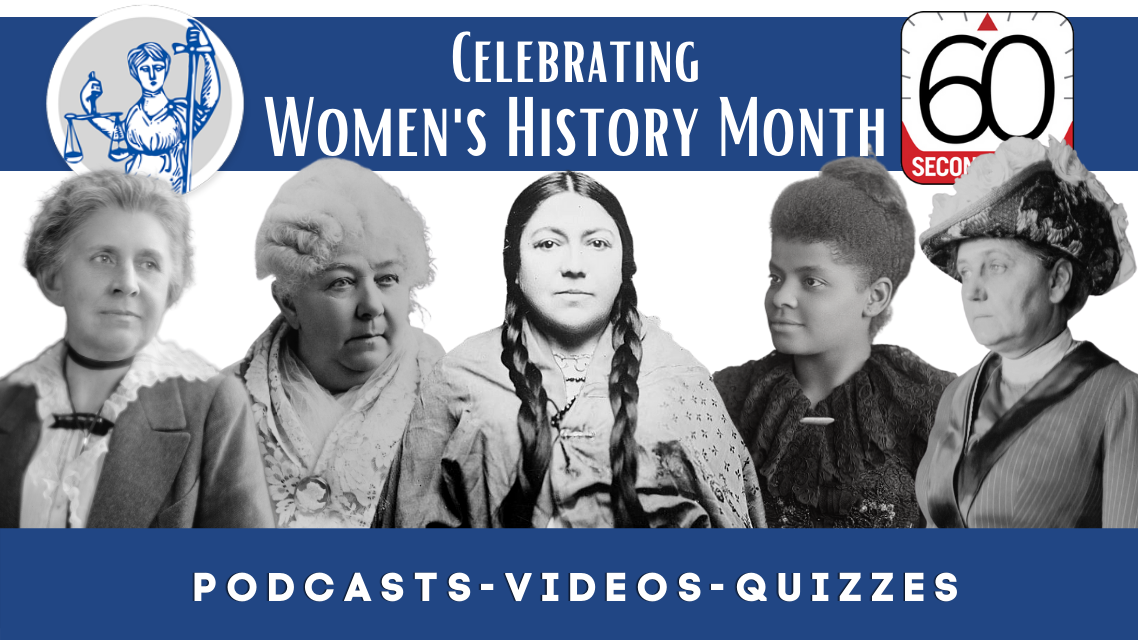
Women's History Month Podcasts from 60-Second Civics
Celebrate Women's History Month with this collection of brief podcast videos from 60-Second Civics.
Each episode below contains a video, quiz, and script. 60-Second Civics makes a great warmup activity for your classroom! Here is an easy and fun way to get your students started each morning:- Select an episode from the list below each day in March.
- Play the video for your class by projecting it on the board.
- Ask students to answer the Daily Civics question as a class.
- Debrief the activity by asking students why the correct answer is true.
The Struggle for Equality: Women's History Month, Part 1
March is Women's History Month! All this month, 60-Second Civics will explain the struggle for equal rights for women and how our Constitution and laws evolved to make our nation a more representative democracy. In this episode, we briefly trace the struggle of women for equal voting rights in the United States.
Coverture and the Colonial Era: Women’s History Month, Part 2
A married woman living during the American colonial era would have lived under the legal doctrine called "coverture," where her legal identity was subsumed under that of her husband. William Blackstone wrote, "By marriage, the husband and wife are one person in the law: that is, the very being or legal existence of the woman is suspended during the marriage, or at least is incorporated and consolidated into that of the husband: under whose wing, protection, and cover, she performs every thing." This was governed by colonial law before independence and state law after independence. It would not change substantially after the Revolution in most states, but divorce and child custody laws would change.
Ona Judge: Women's History Month, Part 3
Ona Judge escaped George and Martha Washington's household, where she was an enslaved housemaid, and made her way to Portsmouth, New Hampshire, where she eluded George Washington's determined attempts to capture her. She made a new life for herself in New Hampshire, marrying and having three children. Her side of her remarkable story survives because she gave interviews to at least two abolitionist newspapers.
Elizabeth Freeman: Women’s History Month, Part 4
Elizabeth Freeman, also known as Mum Bett, escaped slavery in a way that was unusual: she took her case to court. She approached lawyer Theodore Sedgewick with this question: "I heard that paper read yesterday that says 'all men are born equal,' and that every man has a right to freedom ... won't the law give me my freedom?" Appealing to her natural rights and her rights under the Massachusetts Constitution of 1780, she sued for her freedom and won.
Nanye'hi: Women's History Month, Part 5
Despite being known as the "War Woman of Chota," Nanye'hi, also known as Nancy Ward, was a Cherokee woman who would work for much of her life to ensure peace between the Cherokees and the Americans, while attempting to prevent the further seizure of Cherokee land.
Native American Women in the Colonial Era: Women's History Month, Part 6
Europeans were surprised that Native American women had so much power and influence, particularly within the Haudenosaunee nations. In those nations, women held political power within the tribes, appointing and removing chiefs at their discretion.
The Daughters of Liberty: Women's History Month, Part 7
At the start of the American Revolution, women patriots organized into a group known as the Daughters of Liberty. Like their male counterparts, the Sons of Liberty, women took action, such as boycotts, to protest British policies. For example, they replace imported British tea with "liberty tea," made from leaves, herbs, fruits, and flowers, like goldenrod. Without women's adherence to the boycotts, they would not have been effective.
Women During the Revolutionary War: Women's History Month, Part 8
Women served the American cause in many ways during the Revolutionary War, even as combatants.
Margaret Todd Whetten: Women's History Month, Part 9
Margaret Todd Whetten and her daughters provided food, clothing, and support to American prisoners in New York City, despite being called by one British jailer the "damnedest rebels in New York." They provided a safe refuge for American spies in their home, saving them from capture and certain hanging. As as result, her house became known as the "rebel headquarters."
Mercy Otis Warren: Women's History Month, Part 10
Mercy Otis Warren was a playwright, poet, historian, and Anti-Federalist political commentator during the American Revolution. She was a talented writer, admired for her skill and her dedication to the principles of natural rights behind the Revolution.
Women's History Month YouTube Playlist
We hope you've enjoyed the Women's History Month series from 60-Second Civics. Please check out our YouTube playlist to access 21 more episodes in this series! More will be added to this page soon.















